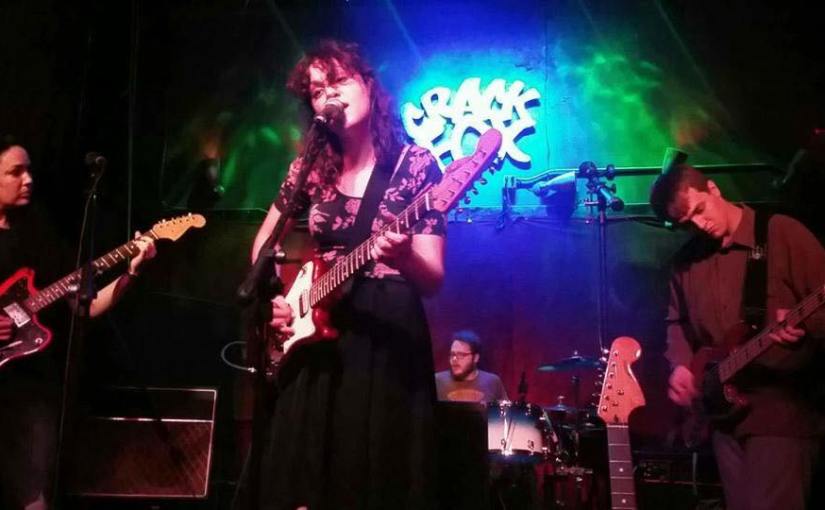Ripped fishnet tights.
Smoke machine.
Dimly-lit nightclub.
Electric guitar.
My younger sister, Demi Josephine Haynes, is without a doubt the cool sister.
By day, Demi is a veterinary technician (exotic birds are her favorite), but, by night, she’s the lead singer and guitarist of a shoegaze band called Seashine.
Late on weekend nights, you can find her with her band in all black, center stage in a hip venue, plugging in her amp to do what she does best: hypnotizing a crowd with the songs she wrote herself.
The most badass part? With Seashine, Demi is helping revive the shoegaze genre (think My Bloody Valentine and Beach House) amongst people who love the ethereal “dreampop” sound. If you live in the St. Louis area, you might have heard Seashine on the radio or live at The Pageant, opening for Explosions In The Sky.
Here’s Demi herself to tell you more about how she moves the world:
BB: Alright, first of all, it’s still so rad to say my sister’s the lead singer of a band. What’s it like to be the Seashine frontwoman and what’s it like to hear yourself play?
DH: It’s an honor to be amidst such talented musicians and good people who somehow also want to listen to what I have to say — or sing.
Hearing the music that I wrote surrounding me when we play is probably the craziest feeling in the world. I constantly remind myself how lucky I am.
BB: Most people aren’t familiar with shoegaze, which you call a “lost genre.” How do you describe it?
DH: Most people describe shoegaze as a fuzzy, dreamy, reverb-laden wall-of-sound and I’d say that’s pretty accurate. But maybe, at the end of the day, it’s subjective.
BB: It’s obvious when you perform that the Seashine crew is super tight-knit. What does it take to be a member of the band, besides owning lots of cool black clothes?
DH: Considering the age gap between myself and Paul and Bill and Kate, I’m surprised that we could be so tight-knit. But, at the end of the day, we can respect one another because of our shared talent.
We can be intensely involved in an intimate song, and then we can hang out, laugh, have a beer, and nothing is ever awkward. You need to be able to go camping together on the weekends and forget that you need to be recording vocals.
You have to be able to compromise, but also be a leader and a teammate. Ultimately, you have to believe in the music you’re playing. Black clothes help too.
BB: It’s kind of hard to describe what it was like to see you perform with Seashine for the first time. You seem so cool and collected in front of the microphone. It’s totally badass! Do you still get butterflies when you get up there?
DH: Of course I do. And of course, it depends on the size of the audience, the venue, and if we are trying to impress the touring band.
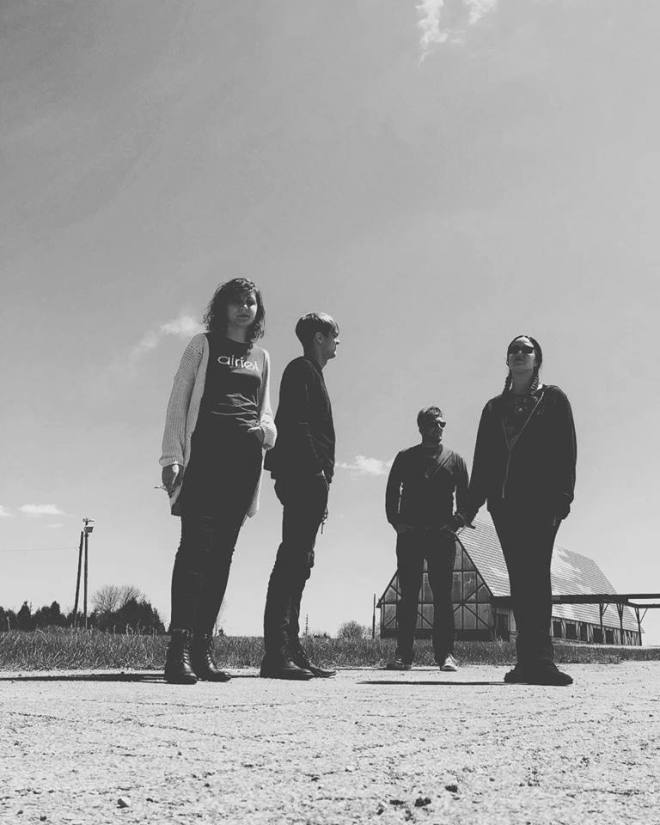
BB: One thing I love about Seashine is that you like to record in unique spaces, like old churches and cabins. What does that do for you, creatively?
DH: Recording in open, rustic spaces is very inspiring and very quiet. Not only does it serve well for a silent, maybe echo-y recording space, but it’s also peaceful and relaxing. It gives you a break from interruptions and blue screens. And that is something that every band or artist could use in what sometimes turns out to be a somewhat stressful time.
BB: Tell us about your upcoming album.
DH: Our upcoming album is self-titled and is our first LP (long-playing album), consisting of 10 tracks. We started recording about a year ago in a cabin and have been building on it slowly since then. The album feels long overdue, so I’m very anxious to have it out and listenable.
BB: Where will we be able to hear it?
DH: We’ll have our very own Bandcamp page up and running as soon as the album is released.
BB: Okay, so, this isn’t something that people generally talk about openly, but years ago you were diagnosed with severe depression. You’ve said that your writing is often tied to your emotions. Does that change your music?
DH: I firmly believe that my emotions completely dictate what kind of product I’m producing. In the past, as I struggled through the trials of youth, my music was full of passion, deep desire, and frequent desperation.
And, now, as I am finding my way through adulthood, I’ve found that not only is it more difficult to find the time to play or record, but I am also experiencing new and more complex emotions in my music.
I don’t usually look back at what I’ve written in an effort to analyze the emotions that I must’ve been feeling at that time. But I do find that, listening back, I can easily relive those feelings again, including the pain, the yearning, and the sorrow.
All in all, I believe I would not be able to make the music that I do if it were not for the depression.
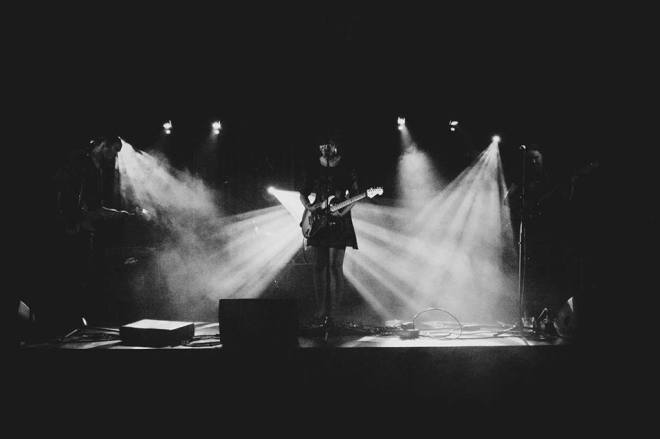
BB: Battling depression takes a lot of courage and you’re a total inspiration to me. Do you have words of advice for other people taking on an entrepreneurial venture like starting a band, especially those with mental health challenges?
DH: I guess what’s most important is that you find other people who believe in the music you’re making unless you are looking for a collaborative environment. If you want a live audience to hear the music that is circling around in your head, don’t let loose that idea and don’t compromise.
BB: You’ve been singing tapping out rhythms on the dinner table since you were a baby. What’s it like to have music be such a key part of who you are (for those of us who can’t carry a tune)?
DH: I guess it’s innate. I don’t listen to talk radio or podcasts; I look forward to driving to work so that I can check out a new album. When I’m with certain people, music is all I talk about.
I’m always looking for inspiration all around me, and my first thought will often be “Hmm, that would be a cool lyric.” It’s really all-consuming.
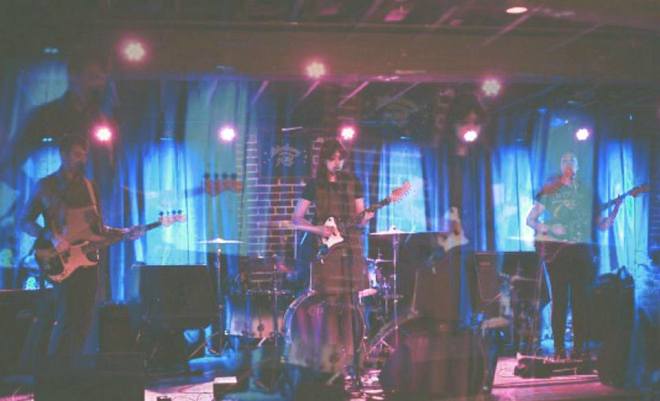
BB: Your lyrics are sometimes deeply personal. What does it feel like to sing them to a crowd?
DH: Some of our songs are more personal than others. I’ve found that those songs, in particular, began their lives as one of my solo project songs. That’s the outlet through which I’ve sieved most of my emotions.
But, in the end, whether or not I write lyrics carelessly, they seem to always contain deeper meaning than I ever expected.
BB: What do you hope Seashine’s music does for people?
DH: I hope that it gives someone the same feeling of purpose and inspiration that so many artists’ music gives me every day. I hope that people who come to our live shows can let their minds go somewhere else for a moment. If anything, I hope it can be enjoyed in the background while they work.
BB: What’s the best compliment you can pay a musician?
DH: I believe any artist really just wants to know that their art touches someone else in some way. Nothing makes me happier than knowing that my music makes someone feel inspired or moved.
BB: You and I both have a version of a brain disorder called synesthesia. How does it function for you and does it play a role in your music?
DH: I experience synesthesia in a few ways: music notes, letters, and numbers all have respective colors, I “see” a color-coordinated calendar, and when I listen to music colors and shapes appear in my mind’s eye.
BB: Our dad is a painter and we grew up in a very artsy and musical crowd. Do you think that affected how you pursued music?
DH: Absolutely. Every day I remind myself how lucky we are to have grown up in a family that supports artistry endlessly. I believe that had I grown up in a different environment I wouldn’t have had the support that pushed me to finally pursue my passion.
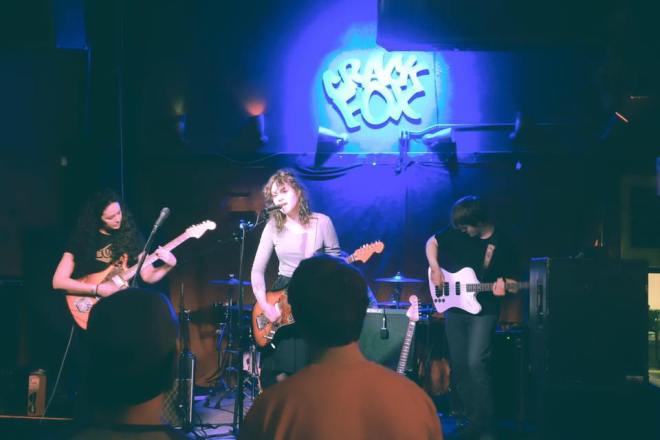
BB: What motivates you?
DH: All sorts of things motivate me, although I’m definitely not always motivated to write. Sometimes I’m motivated by positive things like pictures or scenes in my head or songs that I’ve heard. Other times I’m motivated by sheer frustration of lack of will, or by comparing myself to other artists.
BB: What inspires you?
DH: Everything inspires me. Films, other artists, books, stories, conversations, strangers, dreams, nightmares, the night. I like to create worlds inside my head that I can illustrate through my music, and those worlds are a conglomeration of everything that inspires me every day.
BB: What makes you feel like a badass?
DH: Playing music with my friends who I love and who respect me makes me feel like a badass.
Being surrounded by people who care about and are inspired by my work make me feel like a badass.
BB: What’s your dream trivia category?
DH: Hmm… The Tenth Kingdom trivia?
BB: Is there anything else you would like to add?
DH: I love my big sister and I’m so proud of her.
BB: Thanks, Dem. I love you, too.
Check out this Riverfront Times review of the band to learn more about Seashine.
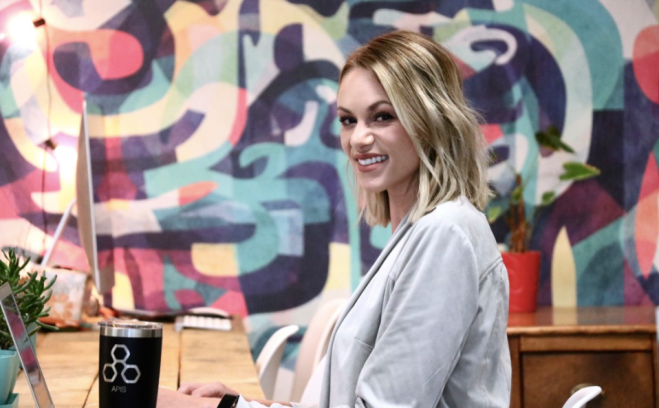
Author Micah Larsen is a persuasion scientist and consultant. Her job is to teach people how to use subtle persuasion in their emails, conversations, and campaigns to get others to say “yes.”
Watch one of her short persuasion how-to videos of $9.97 value for free here using code:
BADASSERIE
